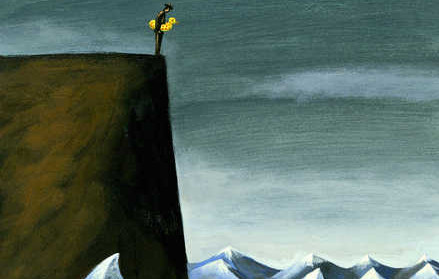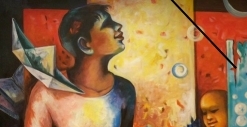Lately I have been thinking about the burden of freedom. What I mean by freedom is not the civil freedom of being out of jail, but an existential freedom: freedom from unfulfilled desires, from debilitating illness, from time-consuming commitments, from limiting beliefs. The kind of freedom that makes you wake up on Saturday morning, have your breakfast, come into the living room and think to yourself “no one expects anything from me today, I have the whole day to myself, to do anything I want. So, what should I do?”
It is this freedom that I have come to experience lately. The convergence of several factors contributed to this: my approaching discharge from army, which was a long 6 years commitment; completing my MBA degree, which took considerable time for the last 2 years; professional crossroads; my nice bachelor apartment which I moved to in August; decent health.
All of this made my evenings and weekends almost completely free from external commitments and dependencies. There were no more excuses to hang to, no more reasons to do anything I shouldn’t be doing. I was facing the dread of freedom.
It’s the same feeling you get when you stand on the edge of a cliff. Its not only the fear of falling that you feel, but even more so, the fear of throwing yourself over the edge. There is nothing that holds you back, no strings attached. And that’s scary.
So I have been looking for ways to cope with this freedom. Trying not to escape it, or hide from it behind a facade of meaningless activities and projects, but to cope with it. And so far I have found two approaches that seem to work for me:
- Self-exploration – the freedom I am talking about is not only freedom from the outside world, but also from yourself. Being open and flexible by nature makes it easy for you to doubt yourself. And the only way to find certainty in who you are and who you should be is by asking yourself questions, reading books, thinking about the big picture of your life and the distant corners of your personality.
- Anchors – isolation is freedom’s ugly relative. Living alone, being a knowledge worker, (which means sitting in front of computer many hours a day), its easy to feel isolated and detached from the world. So its important to find anchors – meaningful commitments that connect you to the world. And usually they are right there – there is no need to travel far to find them: its visiting parents, seeing a close friend, being friendly to a neighbor. And it doesn’t have to be a social visit per se: going to cemetery to visit your grandma’s grave, or watching national team’s football game can have the same effect. It’s about connecting: connecting to people close to you, connecting to your past, connecting to your national identity.
So as much as this freedom is frightening, it can also be enabling. If we have the courage to face the central questions of our lives, we might be rewarded with quiet confidence and peace of mind.



Mike, congrats on the new blog – a totaly new direction.But a challenging question to you: how about freedom from the question "what should I do?"are you really free if you feel the need to ask yourself this?why should you do anything at all?
Mike, congrats on the new blog – a totaly new direction.
But a challenging question to you: how about freedom from the question "what should I do?"
are you really free if you feel the need to ask yourself this?
why should you do anything at all?
I guess in every one of us there is a neutral spectator, a voice that judges and evaluates us.And to this voice of conscience we are held accountable for our thoughts, intentions and deeds. So I guess it is this inner voice to which we need to justify our actions or lack of those.And probably there are two ways to be freed from this question: to answer it fully and wholeheartedly or to escape it. For those of us not ready to do either of these, the question remains 🙂
I guess in every one of us there is a neutral spectator, a voice that judges and evaluates us.
And to this voice of conscience we are held accountable for our thoughts, intentions and deeds. So I guess it is this inner voice to which we need to justify our actions or lack of those.
And probably there are two ways to be freed from this question: to answer it fully and wholeheartedly or to escape it. For those of us not ready to do either of these, the question remains 🙂
OK, but what about the 3rd option?The one of being freed completely from this inner voice that seems so ominous and always-present.Should we really be needing to justify our actions to this inner voice? or can we also be free for that?I agree that even thinking of such an idea is challenging, but maybe that's the whole point.
OK, but what about the 3rd option?
The one of being freed completely from this inner voice that seems so ominous and always-present.
Should we really be needing to justify our actions to this inner voice? or can we also be free for that?
I agree that even thinking of such an idea is challenging, but maybe that's the whole point.
I think what you suggest is suppressing the conscience, or super-ego in Froyd's lingo. But that is our better part – the one that makes us feel guilty whenever we are selfish, and proud whenever we are worthy of respect. Without it, what are we left with? Egoistic ambition, animal instincts and biological needs. And that is not who we want to be really.
I think what you suggest is suppressing the conscience, or super-ego in Froyd's lingo. But that is our better part – the one that makes us feel guilty whenever we are selfish, and proud whenever we are worthy of respect. Without it, what are we left with? Egoistic ambition, animal instincts and biological needs. And that is not who we want to be really.